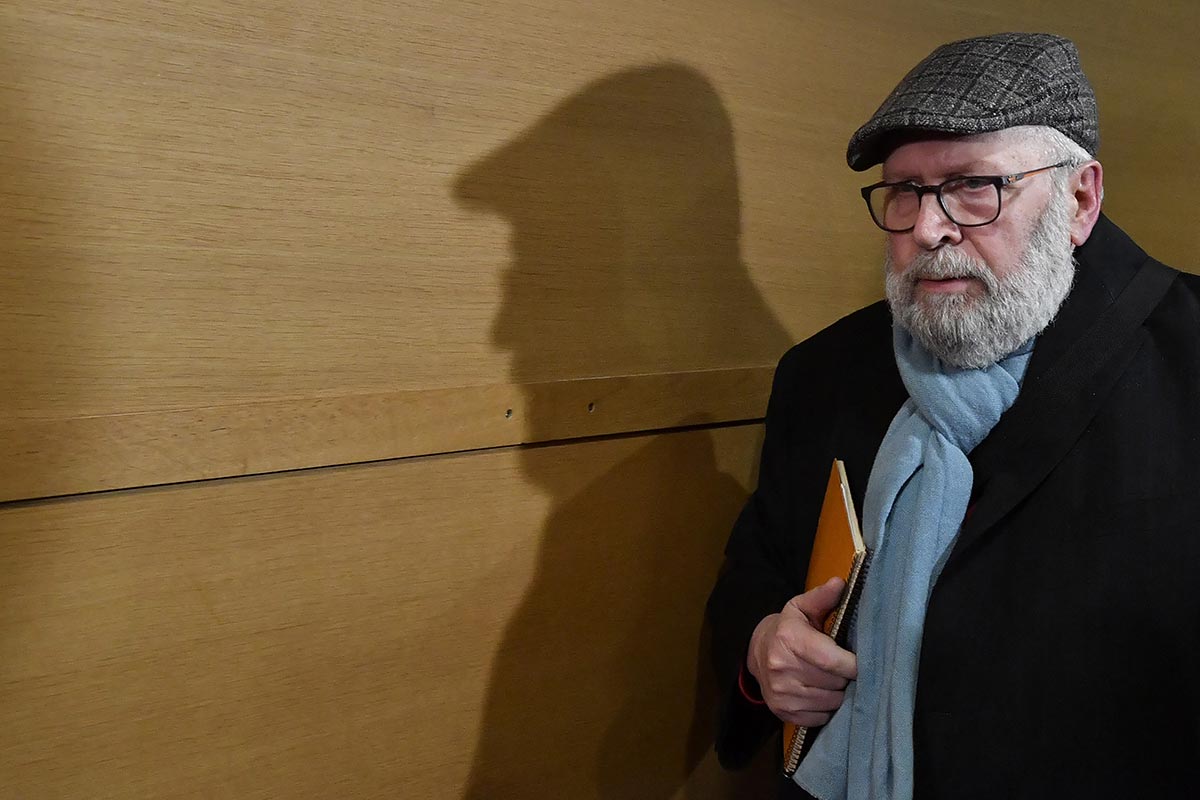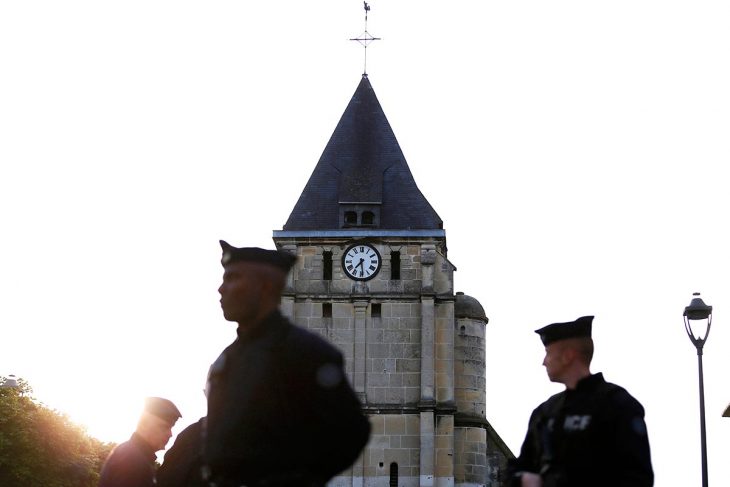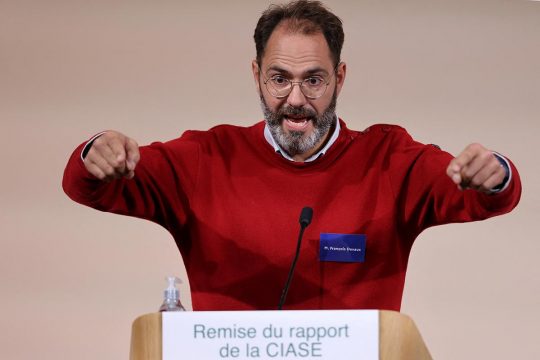"I was able to turn the page thanks to my abuser’s trial," says Olivier Savignac, one of the few victims of sexual abuse in the French Church whose assailant was tried and convicted. According to archival research - Church, judicial and media archives - carried out by the Ecole Pratique des Hautes Etudes at the request of the Independent Commission on Sexual Abuse in the Church (Ciase), only 330 ecclesiastical abusers have been tried and sentenced in France since the beginning of the 1950s, out of a total number of abusers estimated at between 2,900 and 3,200. The real number may be much higher.
The statute of limitations is the reason evoked to explain this gap and the fact that Ciase itself has only referred 21 cases to the justice system, whereas more than 6,000 victims testified before it and it has recorded 330,000 victims. "The hearings of victims carried out by the Commission involved mostly people aged 60 or even 70. Few of them fit the box for a possible criminal prosecution, because of successive laws on the statute of limitations for sexual assaults on minors,” says lawyer Nadia Debbache, who defended the victims of Father Bernard Preynat in a highly publicized trial that led to his conviction in Lyon in 2020, and which raised awareness in France.
New statute of limitation rules
The Commission’s report also specifies that 42 other cases were reported to the Church. "These were time-barred cases where the perpetrator is still alive," says Antoine Garapon, a magistrate and member of Ciase. The report indicates that 56% of the sexual violence committed by members of the clergy took place between 1950 and 1969 - the "height of the violence". All of these cases are time-barred. In French law, the statute of limitations cancels legal proceedings for sexual crimes against minors after 30 years, for rape after 20 years, and for sexual assault and harassment after six years.
This wall has been breached very partially with the law of April 21, 2021, intended "to protect minors from sexual crimes and incest [by creating] new statute of limitation mechanisms that allow more punishment of perpetrators long after the event". This reform targets repeat offenders. From now on, if an aggressor commits another attack before the statute of limitations has expired for a first victim, the latter will benefit from a new statute of limitations. "This gives the victim more time to break their silence, because we know, in the context of these offences within the Church, how important time is in order to come forward," says Debbache. This so-called "rolling" statute of limitations also lengthens the period of obligation for witnesses of such acts to denounce them.
“This is a great step forward," says François Devaux, a victim of Father Preynat and founder of the association La Parole Libérée, now dissolved. “It shows that justice is finally reaching the heart of the Church and its endemic problems.” Garapon says this will only be the case “if victims and associations take it up". "It is one of those laws that offer a possibility to victims or associations. We have a similar situation in environmental matters: it will depend on the pugnacity of the associations or the victims to put this provision into effect.”
The Ciase report clearly discards the option of legislative reform to further extend the statutes of limitation. “It would not improve acknowledgment of the facts and would not help the healing of victims confronted with a criminal trial whose outcome is all the more uncertain for coming so late."
Accords between prosecutors and dioceses
Following the Ciase report, Minister of Justice Eric Dupond-Moretti sent a letter to public prosecutors asking them to "systematically open a preliminary investigation, including for facts likely to be time-barred. Debbache agrees with this: “The public prosecutor's office should systematically investigate if a victim comes forward to denounce time-barred acts that took place during their childhood, or if it is a vulnerable person." This allows other victims to be identified in cases where the aggressor is a repeat offender. "This was the case in the Preynat affair; the first victim was time-barred, the second also, but the third one was not. A criminal investigation could be opened," the lawyer explains.

"The statute of limitations considerations are quite complicated; they depend on the age of the victim and the nature of the facts (crime or misdemeanor). The more evidence there is, the more complicated the statute of limitations can be, hence the benefit of an investigation to find out more," agrees Jacques Dallest, public prosecutor in Grenoble (southeast France). Dallest is one of the first public prosecutors (after the Paris prosecutor) to have put in place an agreement between courts in the jurisdiction of the Grenoble Court of Appeal and the bishops of the region. This was done in November 2019, well before the Ciase recommendation "to generalize accords between public prosecutors and dioceses".
“An accord means obligations on both sides: The bishops must inform the prosecutor as soon as possible, by e-mail, telephone or mail, that they have received information about abuse, without trying to find out more,” explains Dallest. “It is up to the prosecutor to open an investigation, so that the bishop is not accused of having covered up a case, or of having tried to steer it this way or that.” In Grenoble, for example, two preliminary investigations are under way on suspicions of sexual assault following a report from the bishop of Isère. At least one priest is concerned. Dallest says the accord "is a beautiful document but it must be made to live, to be applied. This approach has existed for years in different areas. Experimenting with bishops is very new, the subject is very sensitive, but we need such accords in the 36 French courts of appeal”. To date, 17 public prosecutors' offices in France - each under the jurisdiction of a court of appeal - have signed an accord of this kind.
Collective complaints from victims?
But criminal cases are not enough, Ciase stresses, because to have investigations, victims still need to come forward. "In cases of sexual violence, and even more so when it comes to the Church, victims sometimes take decades to break their silence because psychologically it is very hard [to start a criminal procedure]," says lawyer Debbache. Garapon adds that this is why very often "victims want recognition or consideration of their claim more than a conviction”.
As well as the primary responsibility of the aggressor, the Ciase report explores the possibility for victims to invoke the legal responsibility of bishops and religious institutions. A first barrier arises, notes Ciase: the Church is not, in the sense of the law, a legal person, nor are the dioceses and parishes. On the other hand, a religious congregation, convent or monastery constitute legal persons. But in all cases, responsibilities should be established: "Bishops ordain priests, with the powers that bestows on them especially in sacramental matters. As religious superiors they provide through missions they assign contact with children, and some provide the means of aggression."
Ciase goes further to quote the civil code, which states that "one is responsible not only for the damage that one causes by one's own act, but also for that caused by the act of the persons for whom one is responsible", stressing that the justification of this provision is "guarantee of compensation for the victim". In the case of violence within the Church, the report adds, "there is responsibility of the principal (in this case the bishop) and the author of the fault (the priest)”. This is "a very interesting avenue", according to Debbache, who says he is currently thinking about organizing collective complaints from victims.
Restorative justice
Finally, the report calls for a process of restorative justice "which centres on the victim and repairing the wrongs s/he suffered". "One of the ways restorative justice can work,” adds Ciase, “is through meetings between victims, aggressors and representatives of the community or civil society (...) This type of meeting can help reparation, by bringing recognition of the facts, the responsibility of the perpetrator, and the suffering of the victim.”
This form of justice is "very experimental in France, but already very developed in Canada," says Garapon, who studied this issue at Ciase. "It is a very good way to get around the impossibilities of justice; we can see that a formal trial is no longer satisfactory, and even less so for sexual violence.” He admits, however, that to introduce restorative justice within the Church would be completely new.
"We will have to invent the tools of such justice for this specific context," says Carole Damiani, director of Paris Aide aux victimes and member of Ciase. Savignac thinks "it is essential to prioritize the children by firstly worrying about the victims but also thinking about the perpetrators, who very often are not monitored or helped after having served their prison sentence". But he also fears the fragility of such a process: "When we know that a good number of manipulative sexual predators cannot overcome their behaviour, restorative justice is only a partial answer to the problem of paedo-criminality."
Whether inside or outside the Church, it seems all possibilities should be explored to punish and repair child sexual abuse, a scourge affecting one family in ten in France. Thus, the Independent Commission on incest and sexual violence against children (Ciivise) - to which Ciase has passed on its listening service for victims - has just collected 4,200 testimonies in one month. The Church is only one place amongst others where violence takes place.








